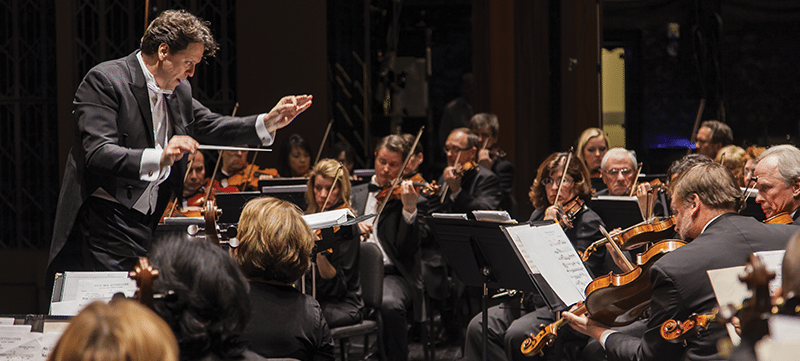
Donato Cabrera understands why audiences nationwide are flocking to live orchestral performances of movie soundtracks.
“The music is every bit as important a character as those on the screen,” says Cabrera, music director for the Las Vegas Philharmonic. “The soundtracks are an integral part of what makes movies so special.”
That’s why the Las Vegas Philharmonic is embracing this trend in its next concert on October 6, by performing one of cinematic history’s most iconic soundtracks, “Psycho,” as the classic Alfred Hitchcock thriller plays on a screen right above the orchestra at The Smith Center.
This was an appealing movie score to showcase, Cabrera says, and not just because it’s nearly Halloween.
“‘Psycho’ is probably one of the most famous movies where the music makes the film,” he explains. “The famous shower scene isn’t gory, you don’t see anything but a knife, but there’s something extraordinary about the scene because of the screeches the violins make.”
Telling a Story Through Symphony
Many might not be aware that Bernard Herrmann, composer of the “Psycho” score, composed the music for nearly all of Hitchcock’s films.
“Hitchcock realized that in Bernard Herrmann’s music, he found the ideal partner to musically express what was happening in his films,” Cabrera says.
Herrmann — who also penned the music for movie masterpieces like “Citizen Kane” and “Taxi Driver” -approached composing in the style that was popular of his era, Cabrera says.
From the 1930s through the ’60s, film composers were often classically trained and applied this to scoring, including with “Psycho,” which features a prominent use of strings to build suspense.
“(Composers) would use the entire orchestra in a very symphonic way to tell the story,” Cabrera says.
This trend largely disappeared in the ’70s, Cabrera notes, when filmmaking reached a turning point and many soundtracks started incorporating popular forms of music like rock and jazz.
“A lot of that had to do with the fact that (studios) couldn’t afford using huge, symphony orchestras anymore, and that was the end of the type of composer like Bernard Herrmann,” Cabrera says.
A Lasting Legacy
Even if Herrmann’s composing style didn’t remain popular throughout his career, his works continue to influence many composers today, Cabrera says, especially the “Psycho” score.
Top composers like Danny Elfman, who writes most of the film scores for director Tim Burton, are known for crafting elaborate, orchestral scores as a throwback to the classic film-scoring style that Herrmann typified.
“Anything is a go these days in filmmaking. There isn’t any single trend,” Cabrera explains of how this style is making a comeback.
And there’s no questioning that “Psycho” and its score have endured through generations of movie fans.
That’s one more reason Cabrera encourages Southern Nevadans to enjoy the philharmonic’s live performance. Audience are even welcome to dress as their favorite Hitchcock character, to fit the suspenseful theme of the evening.
“‘Psycho’ is still used as the example of the ultimate thriller,” Cabrera says. “This will be a fun evening with a whole Hitchcock-inspired theme.”
Originally published at https://www.thesmithcenter.com.
